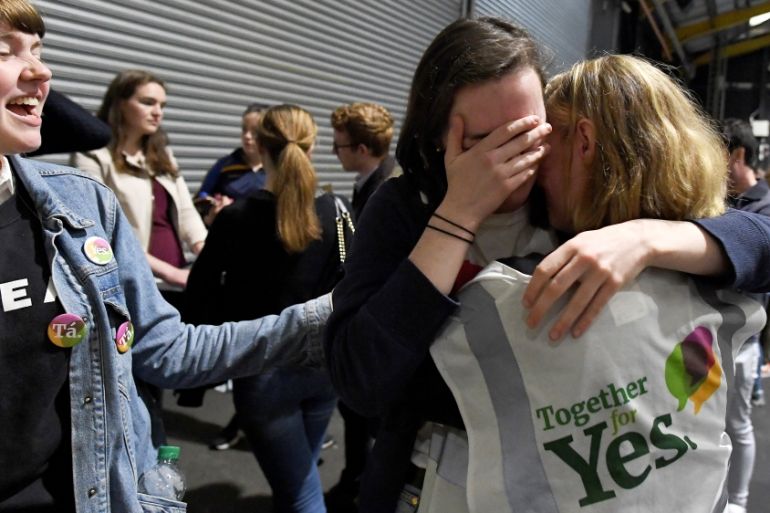Ireland abortion referendum: ‘Monumental day for women’
Anti-abortion campaign admits defeat as early results suggest ‘resounding’ victory for Yes campaign in landmark vote.

Dublin, Ireland – Exit polling and early results suggest that Ireland has voted overwhelmingly to liberalise the country’s strict abortion laws.
Irish voters went to the ballot box on Friday to vote in an historic referendum to repeal the eighth constitutional amendment, which denies women the right to abort pregnancies except when their lives are in danger.
Keep reading
list of 4 itemsNigeria’s women drivers rally together to navigate male-dominated industry
Members of London’s Garrick Club vote to let women join for first time
Why has Australia declared a ‘national crisis’ over violence against women?
By late Saturday morning, the main anti-abortion rights group conceded that it had lost the referendum.
Ireland “weighed it in the balance and it came down on one side,” John McGuirk, communications director for the Save the 8th campaign told national broadcaster RTE. “I obviously would have preferred if they had come down on the other,” he added.
“There is no prospect of the [abortion rights] legislation not being passed.”
Irish Prime Minister Leo Varadkar called the results a “quiet revolution”.
“The public have spoken,” Varadkar told reporters on Saturday. “The result appears to be resounding … in favour of repealing the Eighth Amendment,” he added. “What we see is the culmination of a quiet revolution that has been taking place in Ireland over the last couple of decades.”
Orla O’Connor, a leading campaigner for repealing the abortion law, said it was a “monumental day for women in Ireland”.
“This is about women taking their rightful place in Irish society, finally,” O’Connor, who is the codirector of the Together for Yes group, said on Saturday.
The first result in the referendum rolled just after midday on Saturday, showing 60 percent had voted to repeal the strict abortion law. Official results are expected later in the day.
Strict law
In 1983, “destruction of unborn life” became punishable by up to 14 years’ imprisonment. In the 35 years since, tweaks have been made which allow women to legally access information and to travel abroad for treatment.
However, campaigns to abolish the amendment have been relentless, with increasing support following major scandals such as the “X case” in 1992 and the tragic death of Savita Halappanavar in 2012.
Finally, in 2016, pro-abortion rights groups gathered the momentum for a referendum in which a “yes” vote means “provision may be made by law for the regulation of termination of pregnancy”.
|
|
Following Ireland’s 2015 equal marriage referendum, the abortion vote has provided further evidence that the country is turning away from the Catholic Church, which historically enjoyed a firm grip upon Irish society.
Prominent figures from Irish politics and media publicly announced their intentions to vote “yes”, including Taoiseach (Prime Minister) Leo Varadkar.
He warned voters that, “if you vote ‘no’, nothing can change, and things will persist as they are now where women have to travel abroad to get the care that they need.”
When Friday’s vote finally arrived, voters turned out in droves. In Dublin, a record-breaking 70 percent made their voices heard. Once votes were closed, exit polls for The Irish Times by Ipsos/MRBI suggested there will be a landslide victory in favour of change.
According to a poll of 4,000 voters, the “yes” side is predicted to win in the final count by 68 percent.
Results indicated that majorities in all age groups under 65 had voted “yes”, including up to 87 percent of those aged between 18 and 24.
The results of the exit poll were surprising to Maria Jones, who had anticipated the margin being “very tight”. However, her prediction that “a lot of the older people will probably vote ‘no'” had been correct.
On the other hand, Robert Kennedy expected all along there would be a “yes” majority. Robert believes it’s time for change and that women deserve “the right to choose for themselves”.
Many “no” voters also anticipated the “yes” majority. This included Maria Valerie Prado, who voted at Saint Mary’s Church on Haddington Road. Her prediction still didn’t change her vote, as she believes unborn children “deserve a chance to live”.
‘Joyous scream’
At the Christ the King School Hall on Friday, Sadhbh Donovan had come along to vote “yes”. Her decision had solidified after reading the “In Her Shoes” Facebook page, upon which Irish women described their traumatic abortion experiences, it made her question, “How can anyone possibly vote ‘no’?”
Tina Larkin at Holy Spirit Senior Primary School polling station was convinced to vote “yes” by Repeal campaigns, too. Leo Varadkar changed Tina’s mind when he called door to door in her area and made a speech that “really resonated” with her.
However, Tina’s husband, Billy, had voted “no”. Billy’s Mother had given birth to him out of wedlock, which was totally scandalous in early 20th-century Ireland. He believes if terminating a pregnancy had been legal, he “wouldn’t be around today”.
![Billy Larkin said he would not be around if abortion was legal [Jack Maguire/Al Jazeera]](/wp-content/uploads/2018/05/8e91aba8881e4371b716c50b69e9a1d4_18.jpeg)
Ireland’s Catholic past was at the forefront of Brid McGrath’s mind, too, as she cast her vote.
“I work in what was formerly a Magdalene Laundry. Unmarried pregnant women were sent here and forced to take a vow of silence. Every day, I walk around the place and think of all these women and that silence. Today is a joyous scream for those voiceless women, from what I hope is the majority of Irish people.”
Others were determined not to get too excited before a final announcement. As Valerie Flynn pointed out at Saint Peter’s National School in Phibsborough.
“I know the polls are saying ‘yes’ but can we really trust opinion polls these days?”
![Voter Valerie Flynn outside a polling booth in Phibsborough, Ireland [Jack Maguire/Al Jazeera]](/wp-content/uploads/2018/05/51b249b880c941cb9a525901c735bbbd_18.jpeg)